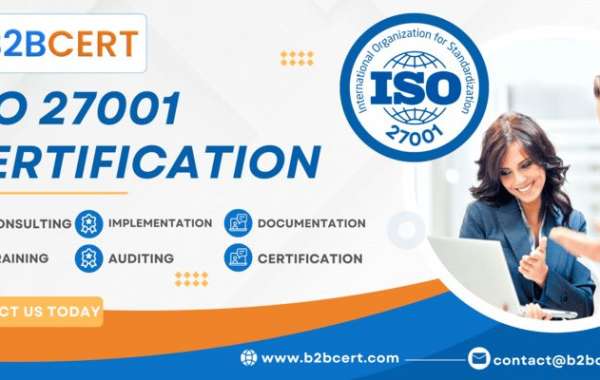ISO 27001 certification is an internationally recognized standard for Information Security Management Systems (ISMS). It is designed to help organizations of all sizes protect their information assets by implementing an efficient, risk-based security management approach. By obtaining ISO 27001 Certification in Bangalore, your company demonstrates a commitment to data security, improves its competitive advantage, and may comply with regulatory or industry requirements.
In this guide, we’ll cover the steps to achieve ISO 27001 certification, including audit procedures, implementation strategies, and the potential costs involved.
1. Understanding ISO 27001 Certification
ISO 27001 provides a structured approach for setting up an ISMS to safeguard information confidentiality, integrity, and availability. This includes managing risks, defining security roles, identifying vulnerabilities, and continuously improving information security processes. Certification involves independent verification from an accredited certification body that confirms your organization’s compliance with ISO 27001 standards.
2. The Steps to ISO 27001 Certification
The ISO 27001 certification process generally includes the following stages:
a. Gap Analysis
Before beginning the formal implementation, it’s advisable to conduct a gap analysis. This preliminary review identifies discrepancies between your organization’s existing security practices and the ISO 27001 standard requirements. A gap analysis provides a roadmap for improvements and helps in setting priorities for implementation.
b. Implementation of an ISMS
Building an Information Security Management System (ISMS) is at the heart of ISO 27001 Implementation in Bangalore. The main components of implementation include:
- Scoping: Define the boundaries of the ISMS, identifying which parts of your organization or data the system will protect.
- Risk Assessment and Management: Conduct a thorough risk assessment to identify security vulnerabilities, threats, and impacts. Then, risk treatment options, including security controls from ISO 27001’s Annex A, must be implemented to mitigate identified risks.
- Documentation: ISO 27001 mandates specific documentation to ensure consistency and facilitate audits. This includes policies, procedures, roles, responsibilities, and records of security measures.
- Training and Awareness: Inform and train employees on the new security measures, highlighting the importance of security practices and how they contribute to the ISMS’s success.
c. Internal Audit
An internal audit is essential before the certification audit. The goal is to ensure your ISMS complies with ISO 27001 Audit in Bangalore requirements and identify any non-conformities. This step may require an internal auditor or an external consultant familiar with ISO 27001 who can assess the system objectively.
d. Management Review
ISO 27001 requires a management review to assess the ISMS's effectiveness. This review evaluates the risk treatment plan, internal audit results, and areas for improvement. Management’s endorsement and involvement are crucial for the continued success of the ISMS.
e. Certification Audit
The final step is the certification audit conducted by an accredited third-party certification body. The audit typically takes place in two stages:
- Stage 1 Audit: This is a preliminary review of your ISMS documentation to ensure it meets ISO 27001 standards. The auditor assesses your policies, procedures, and risk management practices.
- Stage 2 Audit: In this stage, the auditor verifies that your organization has effectively implemented the ISMS. This includes on-site inspections, interviews, and testing of the security measures in place.
Upon successful completion, your organization receives ISO 27001 certification, valid for three years, with annual surveillance audits to ensure continued compliance.
3. Implementation Costs
ISO 27001 certification costs vary widely based on several factors:
- Organization Size: Larger organizations or those with complex data environments typically incur higher costs due to the need for extensive resources, documentation, and training.
- Consulting Fees: Many companies choose to work with ISO 27001 consultants who assist with gap analysis, risk assessments, and implementation, which can increase costs.
- Audit Costs: Certification bodies charge fees based on the scope and complexity of the audit. Initial certification, annual surveillance, and recertification audits each have associated costs.
- Internal Resources: Consider the time and resources required for documentation, training, and internal audits. Organizations often assign a team or hire dedicated staff to manage ISO 27001.
For small to mid-sized businesses, costs can range from $5,000 to $15,000 for smaller implementations, while larger organizations may see expenses exceeding $50,000.
4. ISO 27001 Certification Benefits
Achieving ISO 27001 certification brings numerous benefits, including:
- Improved Security Posture: Implementing an ISMS reduces the risk of data breaches and ensures a comprehensive approach to information security.
- Enhanced Reputation: Certification demonstrates a commitment to information security, improving trust with customers, partners, and stakeholders.
- Regulatory Compliance: ISO 27001 compliance often aligns with various data protection regulations (e.g., GDPR), helping organizations meet legal requirements.
- Competitive Advantage: Many clients prefer vendors with ISO 27001 certification, making it a valuable asset in competitive bids and proposals.
5. Maintaining ISO 27001 Certification
ISO 27001 certification requires ongoing effort. Post-certification, your organization will undergo annual surveillance audits to confirm compliance. Continuous monitoring and improvement, regular risk assessments, and adapting the ISMS to new threats are essential to retain certification.
Conclusion
ISO 27001 Consultants in Bangalore involves implementing an ISMS, conducting audits, and incurring various costs. However, the long-term benefits, including improved data security, regulatory compliance, and a competitive edge, make it a worthwhile investment. The certification process not only enhances security measures but also establishes a foundation for ongoing data protection and management, fostering trust and resilience in today’s digital world.




